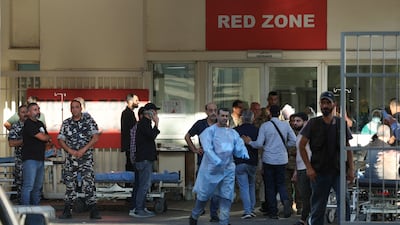Live updates: Follow the latest on Israel-Gaza
The head of the emergency department at LAU Medical Centre-Rizk Hospital in Beirut said her medical staff were faced with injuries “never seen before” after the pagers attack across Lebanon.
Dr Mariana Helou told The National about the overwhelming and unprecedented numbers of injuries the team had to treat.
“Some came in with their eyes pierced, their eyes filled with blood or missing fingers,” she said. “Most had both injuries at once. Hundreds of people have lost their sight and fingers, and are now disabled for life.”
Two waves of explosions on Tuesday and Wednesday on communication devices killed 37 people including two children and a healthcare worker. Thousands more were injured across the country. Dr Helou said that almost all the injuries on Tuesday were extremely critical – about 30 patients from all over Lebanon, primarily young men aged between 20 and 40. The attacks were widely believed to have been carried out by Israel despite it not claiming responsibility.

On Tuesday afternoon, hundreds of pagers, mostly belonging to Hezbollah members, exploded almost simultaneously. CCTV footage showed the devices suddenly detonating in supermarkets and the hands or pockets of users. The next day, a similar series of explosions struck walkie-talkies during the funerals for some of the victims of Tuesday's attack.
UN Human Rights Chief, Volker Turk, called for an independent investigation into the mass explosions on Wednesday. “The fear and terror unleashed is profound,” he said.
Human Rights Watch also called on Wednesday for a “prompt and impartial investigation” into the attacks saying that international humanitarian laws ban the use of booby traps because it can put civilians at risk.
The series of attacks spread chaos throughout the country and overwhelmed hospitals. On Tuesday sirens could be heard in Beirut late into the night.
“We had to prioritise the most severe cases in the “red” category, but all patients were in a critical state, except one,” said Dr Helou.
One of her patients, a boy, arrived with part of his brain exposed from the blast. He was in cardiac arrest, she recalled. “We tried to resuscitate him several times, but we couldn’t save him,” she said.
“We performed 19 surgeries non-stop from 5pm until the following morning.”
She said that most people had similar injuries to their eyes and hands, to the point that it was difficult to differentiate between them had they not been numbered. The hospital was treating 35 patients on Thursday, with some still undergoing surgeries.
Over two days, the hospital treated about 50 patients, and had to refer 30 cases to other hospitals due to the number of cases. “We had so many patients, and our floors were full of wounded,” Dr Helou said.
chief executive of LAU Medical Center
“This is entirely new to us in the context of war medicine,” Sami Rizk, the chief executive of the hospital told The National.
“Hospitals in Lebanon have been accustomed to war surgery since 1975, but this opened a new chapter for us,” he said.
He said the challenge will be to find prosthetics for about 500 people who have lost their eyes, adding that Firas Abiad, Lebanon's caretaker minister of health discussed this issue with him on a visit to the hospital.
“Many patients had facial disfigurements – ears, foreheads, and cheeks, they are somewhat repairable. But the eyes – the eyes are not,” he said.
For many medics, the attacks evoked memories of the Beirut port blast that killed over 220 people.
“This isn’t the first time I’ve seen injuries like this; it reminded me of August 4. We learnt so much from that day,” said an emergency doctor at one of the Beirut hospitals, who requested to remain anonymous.
“Only God knows what we will face next,” Mr Rizk said.


